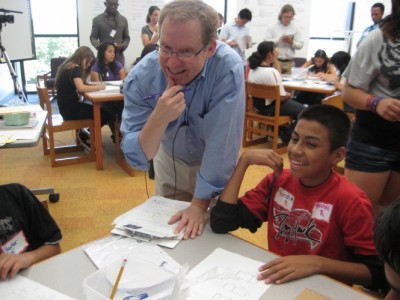What’s a charter school? Or the Common Core? A new poll out today suggests many Americans are unfamiliar with the hottest topics in the education world, and that they’d rather trust their local schools and teachers—not the federal government, their elected officials, or unions—to figure out what’s best for kids.
 Surveys have long found that Americans strongly believe in decentralization and think the schools near their home are doing fine, while schools elsewhere in the country need help. What’s surprising in a new survey published today by 50CAN, a reform-oriented advocacy group that supports more rigorous teacher evaluations and early education, is the relatively lukewarm response to some of the most favored ideas for improving the school system among education advocates and many elected officials.
Surveys have long found that Americans strongly believe in decentralization and think the schools near their home are doing fine, while schools elsewhere in the country need help. What’s surprising in a new survey published today by 50CAN, a reform-oriented advocacy group that supports more rigorous teacher evaluations and early education, is the relatively lukewarm response to some of the most favored ideas for improving the school system among education advocates and many elected officials.
For example: In theory, it seems like Americans would embrace charter schools, according to the poll, which surveyed 6,400 Americans. Seventy-three percent strongly supported “giving schools the ability to make changes without having to cut through administrative and bureaucratic red tape,” one of the main reasons charters were created in the first place.
But 44 percent of those surveyed thought charters are private schools, which they aren’t. And compared to other ideas, like giving principals more freedom, which 77 percent strongly supported, opening more charters or “using public school funding to create schools that are allowed to set their own administrative rules and explore innovative solutions,” the basic definition of a charter, had fewer enthusiastic backers (only 54 and 58 percent strongly supported those ideas).
The poll also suggested that Americans still aren’t sold on the Common Core State Standards, a set of internationally benchmarked standards in math and English adopted by 45 states. While two thirds of those surveyed said they supported “holding all students across the country to a uniform set of high standards,” less than a third supported the Common Core.
Related Stories:
“Most Americans would support the Common Core if they just knew what it was,” the report authors wrote.
Another popular idea that many education advocates embrace was also farther down the list: Providing all 3 and 4 year olds with preschool (62 percent strongly favored this strategy). Two thirds isn’t a bad showing, of course, but the ideas with overwhelming support were focused on giving more power to the teachers and principals inside actual classrooms, with one caveat: That they be better trained.
The most popular strategy among those the survey presented to participants called for reforming not K-12 schools, but the schools that teachers themselves attend. Seventy-nine percent strongly believe we should set “a much higher standard on teacher training programs and entrance tests to ensure a quality teacher in every classroom.”



